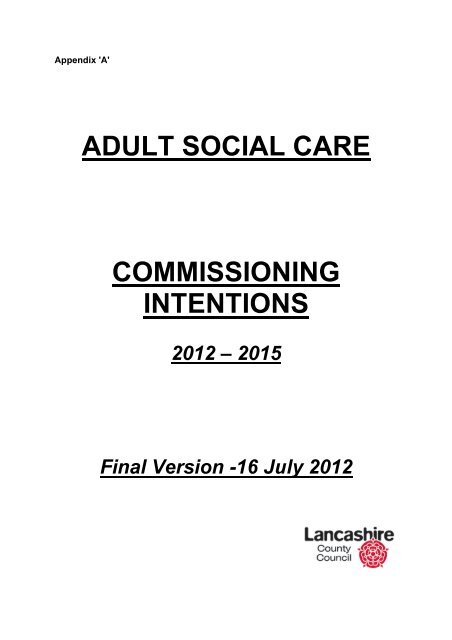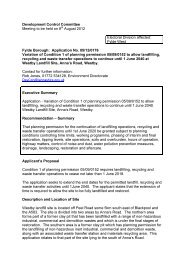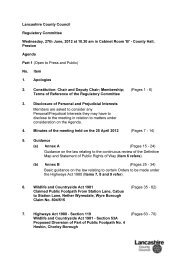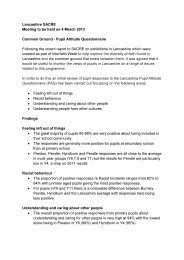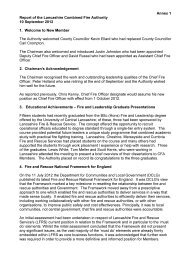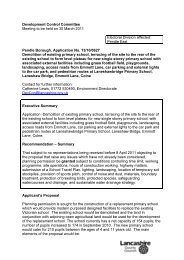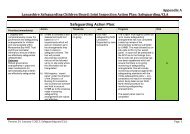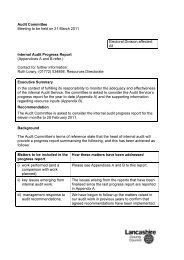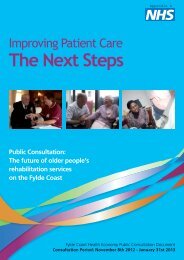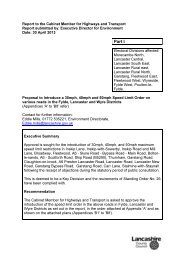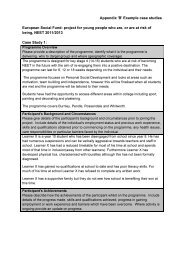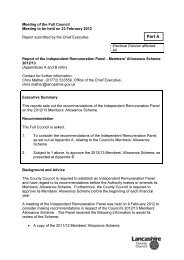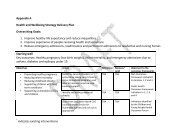Appendix A PDF 81 KB - Lancashire County Council
Appendix A PDF 81 KB - Lancashire County Council
Appendix A PDF 81 KB - Lancashire County Council
- No tags were found...
You also want an ePaper? Increase the reach of your titles
YUMPU automatically turns print PDFs into web optimized ePapers that Google loves.
<strong>Appendix</strong> 'A'ADULT SOCIAL CARECOMMISSIONINGINTENTIONS2012 – 2015Final Version -16 July 2012
INTRODUCTIONThis document describes the adult social care commissioning intentions for thecoming three years. These are our priorities and the changes that we intend tomake. It is hoped that this will be read by citizens, partners, providers and indeedanyone who has an interest in adult social care in <strong>Lancashire</strong>. Many of the intentionscan only be delivered in partnership with other organisations, and we have taken fullaccount of the intentions and priorities of key partners. In particular this documentreflects the priorities identified by the Shadow Health and Wellbeing Board in thedraft Health and Wellbeing Strategy. It also reflects the two core principles at theheart of the recently published White paper 'Caring for our future: reforming care andsupport', namely that we should do everything to prevent, postpone and minimisepeoples need for formal care and support, and that people should be in control oftheir own care and support.What do we mean by commissioning?Commissioning is the set of linked activities required to assess the needs of apopulation, specify the services required to meet those needs within a strategicframework, secure those services, and monitor and evaluate the outcomes.Effective commissioning will:• Deliver the best possible health and well-being outcomes, including promotingequality• Provide the best possible health and social care provision• Achieve this within the best use of available resourcesEffective commissioning means helping local citizens to:• Look after themselves, and stay healthy and independent• Participate fully as active members of their communities• Choose and easily access the type of help they need, when they need itCommissioning for the health and well-being of a local population means• Understanding and anticipating future need• Promoting health and inclusion and supporting independence• Identifying the groups and areas that are getting a raw deal and giving them avoice to influence improvements• Delivering the best and safest possible quality of care.What are the principles which underpin our commissioning intentions?• People should be involved in all decisions that affect their life, and offered morechoice and control over the support they receive. But, choice must bemeaningful. This means that everyone needs to have good advice andinformation about the types of services available including how to access and getthe most benefit from them.
• work with local organisations and community groups to maximise low levelsupport and asset based approaches that can support people to be safe andwell.• develop an integrated approach to commissioning community equipmentservices3. Family carers play a vital role and will continue to be a priority for help andsupport from <strong>Lancashire</strong> <strong>County</strong> <strong>Council</strong> and the NHS.We will:• work with family carers and other partners to develop and implement a newMulti Agency Carers Strategy.• offer the choice to carers to have their assessment and reviews undertakenby local carers services.• explore the development of carers personal budgets.• seek to jointly commission services with NHS partners.4. For people with mental health problems we will build on recentdevelopments in adult mental health services to further support recoveryand social inclusion.We will:• review rehabilitation, supported accommodation and support services with acommitment to act on the recommendations• work with NHS partners to streamline decision making about supportarrangements and funding of people with complex needs, and to improve therange of supports available to those people• ensure that people with mental health problems are supported to becomeindependent, included and involved in their local communities by maximisingchoice and control, including access to self directed supports and personalbudgets• review the role of social work within specialist mental health services• explore innovative ways of evaluating peoples experience of mental healthservices using narrative, experience based design and service userengagement.
5. Work with District <strong>Council</strong>s and housing partners to develop alternativetypes of accommodation which provide choice, enables people to retaintheir independence and whenever possible provides a home for life.We will:• With partners significantly increase the availability of extra care housing anddevelop a consistent model of commissioning across the <strong>County</strong>.• Remodel current supported living services for people with a learning disabilityand ensure that there is a wider range of housing options available from whichpeople can choose.• expand the family placement service (Shared Lives)• pilot a Homeshare scheme in the North of the <strong>County</strong>• minimise the need for specialist out of county placements and provideopportunities for people currently placed in such services to move back totheir home area• reduce the number of people being inappropriately admitted to care homesdirectly from hospital• reduce the number of people with a disability or mental health problem beingadmitted to care homes• complete the actions identified in the Supporting People commissioning planswhich particularly relate to housing related support for people with substancemisuse issues, young people at risk, people at risk of domestic abuse, peoplewho are homeless and offenders.• Implement recommendations of the review of housing related supportservices/sheltered housing for older people which aim to ensure that morepersonalised and targeted support is delivered to people living in all types oftenure.For people who choose to enter a care home, we will work with providers to:• develop personalised support arrangements• reduce unplanned hospital admissions and ensure that staff can supportpeople to remain in the care home until their death (if this is their choice)6. Everyone eligible for ongoing social care support will have a personalbudget regardless of age and condition. We will encourage people to havetheir personal budget paid as a direct paymentWe will:• provide clear information and advice about support options and a simple andquick option to have the personal budget paid as a direct payment
• introduce a simple process that enables people to do as much for themselvesas they choose and offers thinking time before making key decisions• ensure that as block contracts are reviewed or cease individuals will transferto personal budgets. This includes people using supported accommodationschemes; day support services; extra care housing and drug and alcoholrehabilitation services• develop a internet based system which provides information about servicesand allows people to arrange and pay for services on-line should they so wish• enable user led and third sector organisations to offer advice and support topeople to manage their personal budget as an alternative to direct supportfrom the local authority. This includes advice and support to employ personalassistants• explore how people can better access support available in their communities,through local groups and community activities to help them build socialnetworks and provide opportunities to make a contribution to their localcommunity.7. Work with NHS partners to enable people at the end of life to continue tolive in their own home and to die in their preferred place of careWe will:• improve assessment to ensure people at the End of Life and their carers arereceiving the right support• respond to the recommendations of the Social Care Framework for End of LifeCare• with NHS partners develop community based services to avoid unnecessaryhospital admissions• ensure End of Life training for all appropriate staff• with NHS partners ensure the availability of specialist palliative care support• use advance care planning and support planning tools to enable people with aterminal condition to plan for their support at the End of Life• work with Third sector organisations to develop less formal supports.8. Work with NHS partners to enable people with dementia to continue to livein their own home, avoiding unnecessary hospital admissions andpremature admission to residential care.We will:• improve assessment to ensure people with dementia and their carers arereceiving the right support• develop residential rehabilitation to enable people with dementia leavinghospital to re-learn skills• ensure dementia training for all appropriate staff
• extend the availability of short breaks for family carers• with NHS partners ensure the availability of specialist dementia advisors• utilise telecare and other assistive technology to make it safer for people withdementia to maintain their independence• work with the Third sector to develop less formal supports.9. Offer an affordable and effective telecare service.We will:• significantly extend the existing service• develop a specific telecare service for supported living schemes particularlyfor people with a learning disability• work with the NHS to ensure that the telemedicine, telecare and telehealthservices are co-ordinated and complementary• participate in research to test the effectiveness of telecare for supportingpeople with dementia to live safely and independently in the community.10. Work with partners to ensure that the Autism Strategy is implementedacross <strong>Lancashire</strong>.We will:• work with partners to ensure effective diagnosis, assessment and supportplanning• raise awareness and provide specialist training• ensure the development of appropriate support services, through peer andmentor support programmes• support people with autism into work11. Ensure that there is sufficient good quality provision in place, at anaffordable price, for all care users.We will:• continue to constructively engage with care providers through the Social CarePartnership and local provider meetings• publish a clear statement about the types of services that will be required infuture taking account of the ageing population; changing expectations and thedifferent choices people are making• review what we pay for residential and care at home services to ensure thatgood quality provision is available across the <strong>County</strong> at an affordable price
• review current arrangements for procuring domiciliary care for older people,including the preferred provider scheme.• encourage the development of new types of organisations which providechoice and are responsive to how people want to live their life• ensure that all service providers, including personal assistants appropriatelysafeguard vulnerable people• ensure that our investment is actively addressing inequalities, includingcultural, gender and age differences.12. As part of the NHS reforms public health services will transfer to<strong>Lancashire</strong> <strong>County</strong> <strong>Council</strong>. This important change recognises that manyof the root causes of poor health such as inadequate housing, pooreducation and skills and unemployment can be better addressed throughLocal Authorities working together with partners.We will:• develop a joined up approach to planning and deploying resources across the<strong>County</strong> <strong>Council</strong> including the new Public Health responsibilities• analyse how Public Health spend is currently deployed, reviewing and makingrecommendations for future deployment• explore how preventative approaches can be improved with the benefit ofPublic Health expertise and resources, and how we can work better withindividual citizens and communities to improve health• utilise public health knowledge of local demographics, trends, inequalities andmethods in redesigning, delivering and reviewing services and investment.WORKING IN PARTNERSHIPMany of these changes cannot be made by <strong>Lancashire</strong> <strong>County</strong> <strong>Council</strong> acting alone.Commissioning can only be effective if all parties who have an interest in a service oractivity are engaged. Key partners include the following:-CitizensWe will listen to and involve people who use services or who might need services inthe future and the wider public. We will work closely with NHS organisations andDistricts <strong>Council</strong>s to avoid duplication. There are many ways we will involve citizens,and these include:-• work with <strong>Lancashire</strong> LINk (and Healthwatch which will replace LINk in 2013)• work with all existing groups and forums• utilise all types of feedback including participative appraisal, personal andcommunity narratives, appreciative inquiry surveys, compliments andcomplaints• involve people when we are designing, changing and evaluating services ordeveloping new services
• proactively engaging in local communities to better understand how peoplewant to live their lives and the support they need.• Connecting people to local assets, services, support and each other.NHS OrganisationsThe NHS reforms will require new approaches and new ways of working.<strong>Lancashire</strong> <strong>County</strong> <strong>Council</strong> will have new leadership responsibilities which will beexercised through the Health and Wellbeing Board. We will work with NHS partnersto join up services which improve outcomes for people and make better use ofresources.District <strong>Council</strong>sWe will continue to develop joined up approaches with District <strong>Council</strong>s particularlyin relation to health improvement and reducing health inequalities; developing newhousing options; and developing stronger and more resilient communities.Service ProvidersThere many service providers in <strong>Lancashire</strong>, most of which offer care home,domiciliary (home care) or day care services. With greater choice and control, manypeople are beginning to use other types of services. We are already seeing areduction in the use of traditional home care and day care services. Personalisationwill require different types of services, or services being delivered in different ways.Effective communication and engagement with providers is essential. Specificallywe will:-• continue to develop and improve all forms of communication and engagementincluding forums, web based information and opportunities for providerinvolvement in service development and redesign• develop and maintain in partnership with the sector market intelligence whichhelps us to understand risks and opportunities• be more explicit about needs and requirements, gaps in provision andopportunities for service development. Where possible this will reflect howindividuals are choosing to use their personal budgets• publish a Market Position Statement later in 2012.Third SectorVoluntary, community and faith sector organisations are in many cases serviceproviders, but also have a very important role in making <strong>Lancashire</strong> a good place tolive. The Third Sector in its many forms is what binds communities together and canmake such a positive difference to the lives of many people. The role of LCC will beto support a thriving but independent Third Sector.
We will:• support "One <strong>Lancashire</strong>" which is responsible for delivering "TransformingLocal Infrastructure" over the coming 18 months. This will inform how LCCfunding can be effectively invested to support a thriving and sustainable sector• continue to engage effectively with the sector through existing groups andbodies in particular Third Sector <strong>Lancashire</strong>• be more explicit about our expectations and requirements, and encourage thedevelopment of new types of services and new types of organisations(including social enterprise and micro enterprise)• aim to be more strategic in how we deploy resources, which will require bettercollaboration and co-ordination across LCC, Districts and NHS organisations• explore opportunities for the Third Sector arising from new legislationTURNING "INTENTIONS" INTO REALITYThis document has set out to briefly describe our commissioning intentions, butdetailed delivery plans either have been or will be developed for each intention.These plans will include measures of how we will know if the steps taken have beensuccessful.However to illustrate the scale of some of the shifts, the following are offered asexamples. By the end of 2014/15;• 50% (around 6000) of support plans will be undertaken by organisations otherthan LCC.• The number of people taking their personal budget as a direct payment willhave doubled to 4000.• The number of people benefiting from the reablement service will havedoubled to almost 8000.• An additional 100 people will be living with and supported by families throughthe Shared Lives service• Carers Centres will undertake 50% (around 3500) of carers assessments.• The number of people benefiting from telecare will have increased from 1000to 6500.• 300 people with a learning disability in supported living arrangements will bebenefitting from telecare.• The number of volunteers within the <strong>Lancashire</strong> <strong>County</strong> <strong>Council</strong> hub willincrease from 1500 to 2000.• A minimum of 3 new extra care schemes will be under development.An important part of commissioning is reviewing what has been delivered andinvolving people who use the services and other partners in ongoing improvements.
Any comments you have on this document or requests for additional informationshould be made to:-Steve GrossDirector of CommissioningAdult and Community Services Directorate<strong>County</strong> Hall Preston PR1 OLD stephen.gross@lancashire.gov.uk


